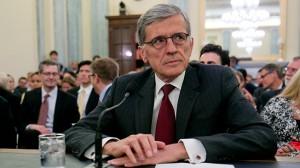A Glimmer of Hope for Net Neutrality
On April 24, 2014 the regulations that the Federal Communications Commission (FCC) had been using for decades to keep the Internet “open” were deemed unconstitutional. This has led many to speculate that Internet Service Providers (ISPs) will start to pick and choose types of content and discriminate against sites that took up more bandwidth (think videos versus pictures; videos require more bandwidth to stream in a higher definition) and favor those that did not, or, alternatively, charge a “premium” to higher bandwidth sites. Even worse, commentators fear that ISPs could slow down websites on the basis of content the ISP did not endorse, such as peer-to-peer file and information sharing.
 There is a glimmer of hope, however. The FCC Chairman, Tom Wheeler, has publicly stated that there will be no turn around in their open Internet policy, and the agency will monitor pricing and speeds for “commercially reasonable” decisions and anti-competitive behavior on a case-by-case basis. Moreover, Wheeler is considering seeking reclassification of monopolies with respect to broadband Internet providers, despite the dissatisfaction and fervent opposition this type of move would make with Republican lawmakers. And finally, ISPs would be required to disclose which sites and what types of content receive the “fast lane” treatment, meaning if any ISP owns right or left leaning news outlets, favoring one over the other could alienate customers.
There is a glimmer of hope, however. The FCC Chairman, Tom Wheeler, has publicly stated that there will be no turn around in their open Internet policy, and the agency will monitor pricing and speeds for “commercially reasonable” decisions and anti-competitive behavior on a case-by-case basis. Moreover, Wheeler is considering seeking reclassification of monopolies with respect to broadband Internet providers, despite the dissatisfaction and fervent opposition this type of move would make with Republican lawmakers. And finally, ISPs would be required to disclose which sites and what types of content receive the “fast lane” treatment, meaning if any ISP owns right or left leaning news outlets, favoring one over the other could alienate customers.
There is one looming cloud over any hopes of what remains of net neutrality, and it comes in the form of two words: “commercially reasonable.” These two words are what keep the FCC’s proposed regulations from being the end of net neutrality altogether; yet, ironically, they are also what make the proposed regulations ultimately doomed to fail.
To be fair, this “looming cloud” may not be all bad. After all, businesses are what make this country strong, and commercially reasonable enterprises should be embraced. Indeed, it is entirely possible that regulations that allow for this type of “competition” could lower the cable bills of daily users like you and me.
However, it should be clear: the FCC is a political organization, and what is deemed “commercially reasonable” on their “case-by-case” analysis under one administration will not be necessarily reasonable under another, and a standard such as this will inevitably ebb and flow with the political tides. Every four to six years, it would not be surprising to see significant changes in “net neutrality”: one term may be friendly to small businesses, whereas the next term may give ISPs a firmer choke hold over pricing bandwidth.
Regardless of whoever is being more straightforward with how the proposed regulations look, it all comes down to a vote on May 15, 2014. And by the look of things, if we are going to mark our calendars for anything that day, it should be as “the day a discriminatory Internet was born, and the day the free Internet died.”


Comments